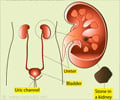Kidney stones, which are often extremely painful to excrete, cost billions of dollars each year in medical care and lost productivity. While the
Kidney stones, which are often extremely painful to excrete, cost billions of dollars each year in medical care and lost productivity. While the stones can sometimes be prevented by drinking plenty of water, avoiding infections and emptying the bladder frequently, medication to reduce the excretion of calcium in urine may be prescribed. These drugs may increase cholesterol and can cause bloating and other uncomfortable side effects.
Men who develop kidney stones are often told to limit their dietary intake of calcium. But new research suggests that restricting animal protein and salt may be a better way to prevent stones from recurring. In the study, 20% of men on a low-animal protein, low-salt diet that contained normal amounts of calcium had recurrent stones after 5 years, compared with 38% of men on a low-calcium diet.The results point to a new dietary approach to manage kidney stones, according to Dr. Loris Borghi from the University of Parma in Italy and colleagues. Reducing calcium intake has not been shown to reduce the risk of recurrent stones over the long term and may cause calcium deficiency, which can weaken the bones. Restricted intake of animal protein and salt, combined with a normal calcium intake, provides greater protection than the traditional low-calcium diet.
A diet that restricts animal protein and salt is thought to reduce the urinary excretion of oxalate, a compound that combines with calcium and other compounds to form the deposits commonly known as kidney stones, the researchers explain. Low-calcium diets, on the other hand, may reduce urinary excretion of calcium but they also cause levels of oxalate in urine to rise.











